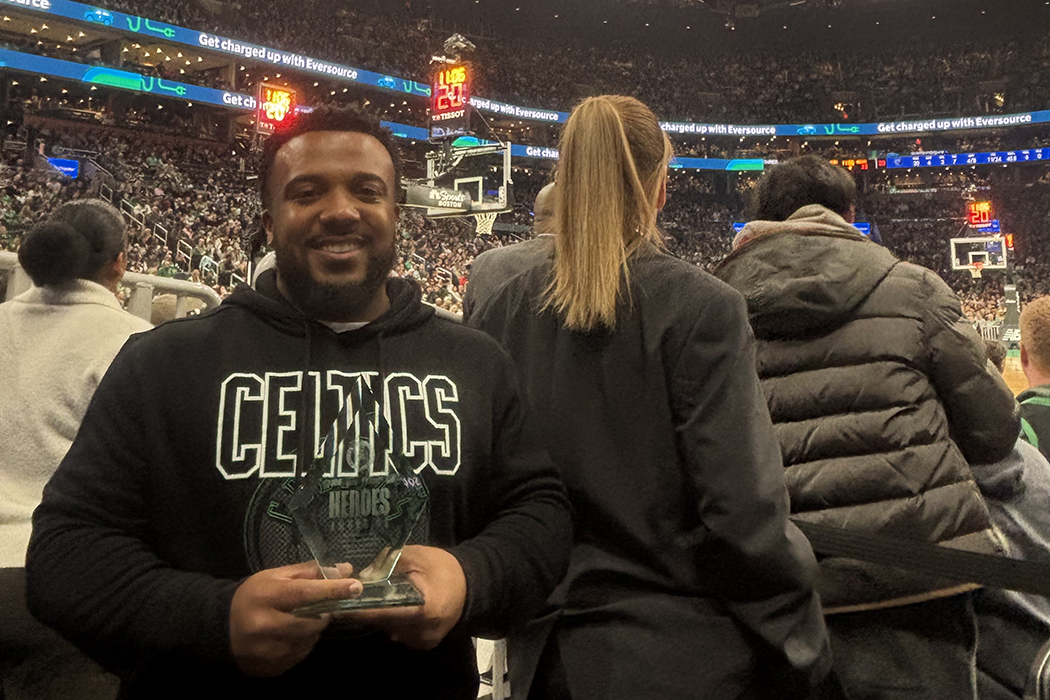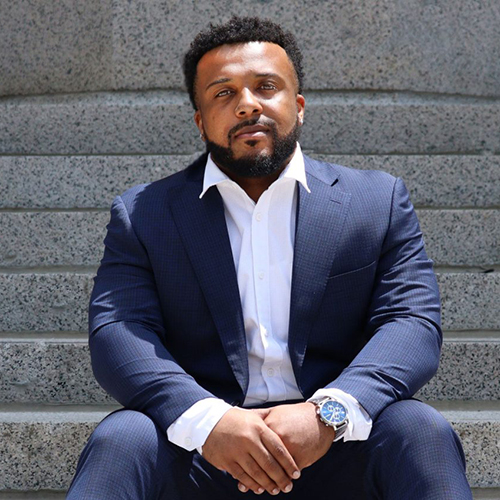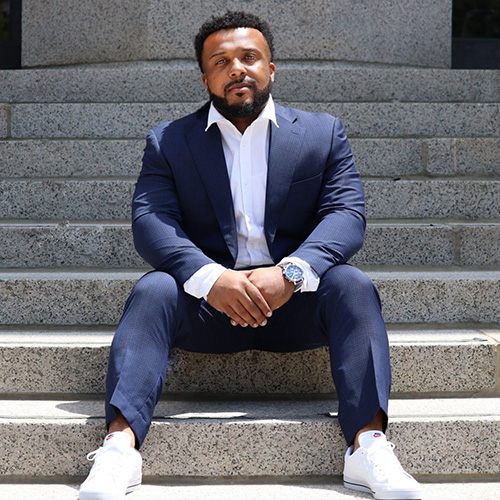
Ed-Dee G. Williams, an assistant professor at BCSSW, says he could not stop smiling when he was recognized at center court during the Celtics-Grizzlies game on December 7 at TD Garden in Boston. Courtesy photo.
During a TV timeout in the second quarter of the Celtics-Grizzlies game on Saturday night at TD Garden in Boston, Ed-Dee G. Williams received a standing ovation from a capacity crowd of 19,600 fans.
And chants of “Ed-Dee, Ed-Dee, Ed-Dee” ringing throughout the world-famous arena had nothing to do with his ability to dunk, hit a fadeaway jumper, or prevent a speedy guard from driving to the rim.
No, Williams, an assistant professor at the Boston College School of Social Work, received raucous applause for creating an application that helps Black youth with autism talk about their mental health.
He was the latest winner of the Celtics’ Heroes Among Us Award, an honor bestowed upon individuals at each home game who have made exceptional and lasting contributions to the local community.
“I heard fans yelling ‘Ed-Dee, Ed-Dee,’ and I could not stop smiling,” Williams recalls. “I was trying to tell myself to calm down, but my cheeks were getting sore.”
While NBA superstars Jayson Tatum and Ja Morant rested on their respective benches after a high-scoring first quarter, Williams took center court to bask in the glory of winning an award that’s been around since 1997.
Dressed in a black Celtics hoodie and holding a crystal plaque, he slowly waved to the crowd as the PA announcer described his work to improve the mental health of Black youth with autism.
“Dr. Williams,” the PA announcer said, “has helped this overlooked community access critical mental health resources focusing on communication skills and anxiety prevention.”
As Williams made his way back to his seats—ninth row, behind the Grizzlies’ bench—he received fist-bumps and high-fives from fans, one of whom even gave him his business card in hopes that they could connect on future research.
Last year, Williams created an app to help Black youth with autism discuss depression and other mental health issues with teachers and caregivers. When the Celtics’ director of community engagement found out about this project, called “Asking for Help,” she contacted him through LinkedIn to invite him to participate in the team’s Heroes Among Us program.
Williams, whose research examines the interplay between race and mental illness, initially balked at the idea. “I hope that my work impacts and improves the lives of those in this community, but I’ve never considered myself to be anybody’s hero and I’ve only been here for two years,” he says. “My first thought was like, no, let me connect you with some of my community partners who’ve been doing this work for 10 or 15 years.”
But the Celtics insisted that the Heroes Among Us Award was designed for people like Williams—people who have made an overwhelming impact on the lives of others.
“I heard fans yelling ‘Ed-Dee, Ed-Dee,’ and I could not stop smiling. I was trying to tell myself to calm down, but my cheeks were getting sore.”
His intervention, created in collaboration with a software company called SIMmersion, uses video and speech recognition to make it seem as though users are having live conversations with teachers who are responding to their statements in real-time. In actuality, users are talking to simulations of teachers, played by actors, who have been given scripts to provide a variety of typical but unpredictable reactions to what they say.
At each turn in the conversation, users select a symptom associated with depression, describe that symptom to a video recording of a “teacher,” and then receive feedback based on the response. Each conversation is unique, so users can practice honing their conversational skills until they feel ready to share their stories with adults who can help them.
Williams is currently using grant funding from the Deborah Munroe Noonan Memorial Research Fund to evaluate the feasibility of the training program, testing the app with Black youth with autism, parents, and caregivers, as well as with social workers, special education teachers, and speech pathologists. He teamed up with several nonprofit organizations and state agencies to help recruit participants for the study, including the Black Autism Coalition and the Massachusetts Rehabilitation Commission.
Williams envisions a future in which the training program is commercially available to schools, therapists, and parents, and he hopes to adapt the app to meet the needs of other populations, too.
“My goal is that anyone who wants to improve these kinds of conversational skills will be able to access this tool,” he says.
As for his experience at the TD Garden, Williams received the royal treatment. He, his wife, and their two children enjoyed a complimentary meal at Legends, a private restaurant at the Garden, received a history lesson on the 18-time champion Celtics, and watched players go through their pre-game routines while sitting courtside.
Although Williams typically roots for the Pistons and Rockets, the Celtics are quickly becoming one of his favorite teams. And why not? Despite losing to the Grizzlies on Saturday night, 127-121, the C’s are the odds-on favorites to win the 2025 title.
“They’re like the Dallas Cowboys of the NBA—they’re America’s team in my opinion,” Williams says. “So I’m definitely a Celtics fan. I was telling my wife that I have to get a Celtics banner.”




